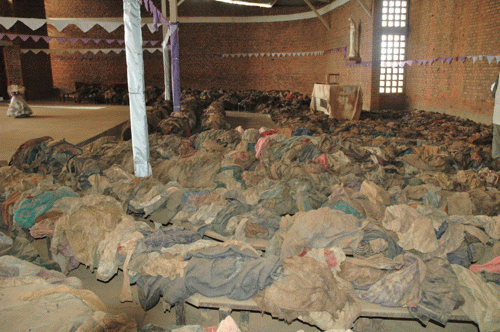Fighting back tears the U.S. Ambassador to the United Nations, Samantha Power, is standing before the Genocide Memorial in Kigali, Rwanda. It is almost 20 years since up to one million Tutsis and moderate Hutus were slaughtered in the April 1994 genocide. Power has intimate knowledge of the details and chronicled all of it in her Pulitzer Prize winning book, A Problem from Hell: America and the Age of Genocide. Still, on her third visit to the genocide memorials, Power is overwhelmed by what she has just seen. A gentle voice from an unseen journalist urges her to speak. "What is your message?" the voice asks. Power takes a deep breath, gathers her thoughts, and reminds the audience that everyone knows what the "United Nations failed to do in 1994 for the Rwandan people." She goes on to call upon journalists and others to make sure that this never happens again anywhere in the world.
Is it coincidence that two weeks after Power's tour of the region, including Congo, that the Obama administration walked back a State Department (DOS) press release castigating the M23 rebel movement? The rebels say they are fighting against persecution of minorities in eastern Congo by the FDLR genocidaires who have joined forces with the regular Congolese army (FARDC) and UN forces.
Is Power behind the new DOS communique?
Something happened in less than 24 hours to cause the change in tone. The Obama administration has once again backtracked on a message, but perhaps this time the administration has hit on the truth and not offered spin when it suggests:
All parties should return to the negotiation table to overcome remaining hurdles to the signing of a final, principled peace agreement, which would establish a permanent ceasefire and hold accountable those who have committed serious crimes.
Maybe someone reminded the Obama administration that proven crimes have been committed, not by the M23, but by the regular Congolese Army in collusion with genocidal forces in the FDLR, now operating with impunity in eastern DRC. Consider Minova where Congolese troops, running in defeat from M23 forces, were ordered to commit rape by their commanding officers. Power addressed the issue during a meeting between the Security Council envoys and Congo's defense, interior, and justice ministers in Kinshasa during her visit.
It is commendable that Power specifically called upon journalists to tell the complete story, something that has so far failed to happen in eastern Congo, where mainstream reporters focus on spoon-fed messages from the government of Congo. Mainstream media completely failed to investigate a statement reported by Inner City Press and attributed to Congo's foreign minister, Raymond Tshibanda, that all rebellions in eastern Congo bear the "same genetic signature." Translation: "Tutsis are to blame."
I will go out on a limb here and say that the government of Congo is involved in internationally sanctioned hate crimes.
I will also guess that Power realizes this.
Check most media reports since the fighting has resumed and you will get only a portion of the truth about the renewed fighting. Press reports, like this one by the New York Times say only that "negotiations broke down and fighting resumed."
M23 and the government of Congo have been meeting since December 2012 in Kampala, Uganda. The International Conference on the Great Lakes Region (ICGLR) brokered the peace talks.
The Christian Science Monitor (CSM) is the only media outlet that has offered more than a spoon-fed analysis of the fighting.
No other media outlet has offered a cogent analysis of a letter sent by Chairman of the M23 Movement, Bertrand Bisimwa, to the UN Secretary General, the head of the African Union, and all embassies in the region. Bisimwa lays out the final three items on the negotiations list. The government of Congo walked away from the table and instigated the new fighting. M23 says they want to conclude the talks.
The three remaining points are integration of troops, demobilization and amnesty.
CSM suggests that the UN Mission, along with the FDLR, FARDC and the South African brigade will gamble and use military might to push M23 to capitulation on the battlefield.
A source close to the M23 says the rebels "Did not fight with the coalition," which used "heavy materials and South African aviation." The source says the M23 have withdrawn to high ground.
On the topic of integration, Bisimwa writes that the M23 is not seeking integration into the DRC armed forces. He notes, as Ambassador Power certainly realizes, that the M23 formed specifically to secure eastern Congo, their own families, and refugees from the threats of the "Rwandan genocide perpetrators." Bisimwa means the remnants of the genocide forces that fled to Congo in 1994, and which now operate as the FDLR, fighting alongside the Congo Army and UN forces.
(Note: You can view every article as one long page if you sign up as an Advocate Member, or higher).






